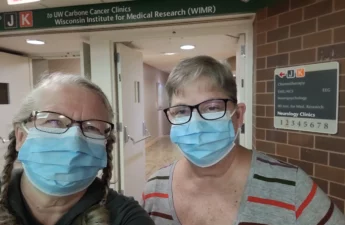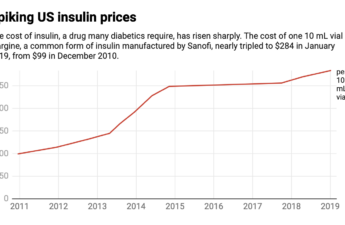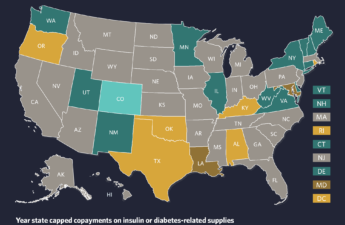Category: Health Costs
What’s New and What To Watch For in the Upcoming ACA Open Enrollment Period
Current enrollees who do not update their information or select an alternative will be automatically reenrolled in their current plan or, if that plan is no longer available, into a plan with similar coverage.
45 Degrees North: The Rural Cancer Commute
If you come from a rural area, you probably know someone who has had to make that kind of commute for treatment. Who has weighed the cost of gas, food and lodging away from home. Who has learned the back ways around a strange city to avoid road construction or rush hour congestion. Who packed an extra week’s worth of clothes, just in case.
At Catholic Hospitals, a Mission of Charity Runs Up Against High Care Costs for Patients
Catholic health systems like CommonSpirit Health, Ascension, PeaceHealth, Trinity Health, and Providence St. Joseph pay their chief executives millions of dollars a year. CommonSpirit Health’s then-CEO Lloyd Dean earned roughly $28 million in 2022; he was among nearly three dozen executives who pulled down more than $1 million that fiscal year, according to the health system’s tax filings. Elsewhere, Rod Hochman, CEO of Providence St. Joseph Health, earned $12.1 million. Ascension CEO Joseph Impicciche was paid $9.1 million, according to corporate tax filings.
With TV Drug Ads, What You See Is Not Necessarily What You Get
One study found that, among top-selling drugs, those with the lowest levels of added benefit tended to spend more on advertising to patients than doctors.
Health News Headlines
Covid cases surge – Measles in Oregon – OTC continuous glucose monitoring – Lower your cholesterol without a statin?
Why Many Nonprofit (Wink, Wink) Hospitals Are Rolling in Money
“Hospitals are some of the biggest businesses in the U.S. — nonprofit in name only,” said Martin Gaynor, an economics and public policy professor at Carnegie Mellon University. “They realized they could own for-profit businesses and keep their not-for-profit status. So the parking lot is for-profit; the laundry service is for-profit; they open up for-profit entities in other countries that are expressly for making money. Great work if you can get it.”
Health News Headlines
Fewer than half of US adults under 50 can readily afford or access healthcare – Misdiagnosis Is A Big Problem For Older Adults – Drugs Used For Weight Loss Help People Stop Smoking – Most Antibiotic Prescriptions For Kids’ Ear Infections Are Too Long – Blood tests for Alzheimer’s diagnosis were 91% accurate in new study
Governments can erase your medical debt for pennies on the dollar — and some are
Medical debt is the leading cause of bankruptcies in the United States, and more than 2 in 5 American adults have some. Some states and cities will use federal money to forgive millions of dollars of their residents’ medical debt.
Some states back hospital mergers despite record of service cuts, price hikes
In much of the country, a single hospital system now accounts for most hospital admissions.
Health disparities cost to U.S. economy tops $450 billion a year
Most of the economic burden for racial and ethnic disparities was borne by Black/African American population (69%) due to the level of premature mortality. Native Hawaiian/Pacific Islander ($23,225) and American Indian/Alaska Native ($12,351) populations had the highest economic burden per person.
‘Grotesque Catch-22’ – Sickest Rural Adults Are the Least Likely to Be Able to Pay for Healthcare
Research on cost barriers to health care found that rural adults were more likely than urban adults to report being unable to pay their medical bills or have problems paying their medical bills. Rural adults also were more likely to use medications in ways not prescribed (like taking pills every other day or only filling prescriptions every other month) to save money on medication.
How Cigna Saves Millions by Having Its Doctors Reject Claims Without Reading Them
A Cigna algorithm flags mismatches between diagnoses and what the company considers acceptable tests and procedures for those ailments. Company doctors then sign off on the denials in batches, according to interviews with former employees who spoke on condition of anonymity.
Eli Lilly is cutting insulin prices and capping copays at $35 – 5 questions answered
High insulin prices have not earned any U.S. manufacturer many friends, with list prices increasing 54% from 2014 to 2019. Most troublingly, an estimated 1.3 million uninsured people with diabetes and patients with inadequate insurance have resorted to rationing their insulin. Skipping doses because of high insulin prices has sometimes had tragic and even deadly consequences.But growing competition has shaken up the insulin market in recent years.
Surprise-Billing Law Loophole: When ‘Out of Network’ Doesn’t Quite Mean Out of Network
Referred to Swedish Maternal & Fetal Specialty Center – First Hill for pregnancy complications, Danielle Laskey, a registered nurse, was surprised with a $120,000 hospital bill.
More States Are Doing What They Can to Cap Insulin Costs
In response to the steep rise in out-of-pocket costs for insulin over the past two decades — enough to compel many diabetic patients to ration their use of the medicine — nearly two dozen states have passed measures in the past few years capping the out-of-pocket costs for some patients.










